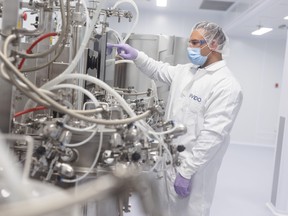VIDO: Saskatchewan’s gift to global health
The opening of its new Vaccine Development Centre advances VIDO’s position as Canada’s Centre for Pandemic Research.

Article content
Imagine the next pandemic threatening our world. Then imagine a superior line of defense against that pandemic: a research and vaccine facility already waiting and prepared to fight it. Imagine no more. That facility already exists, at the University of Saskatchewan.
Created in 1975 to fight infectious diseases in Canada’s livestock industry, VIDO — the Vaccine and Infectious Disease Organization — has evolved to a “one health” research centre addressing disease pathogens in both animals and humans. No other infectious disease facility in the nation comes close to its current capacity and record of achievement.
“We operate Canada’s largest high-containment infrastructures — one of the largest in the world — to work with really dangerous pathogens,” says Dr. Volker Gerdts, VIDO’s director and CEO. “We have just added an in-house manufacturing facility for vaccines and are building a new facility to house exotic species from which we often see these diseases emerge, and we will be one of only two facilities in Canada with Level Four containment ability.”

In the world of disease research, “containment” refers to the very strict standards a facility must meet to conduct research on increasingly hazardous disease-causing organisms. Level One is used to study non-harmful bacteria such as the yeast used in baking or in brewing beer. Level Two would be the containment to study things like the viruses that cause the common cold. At Level Three, things become more serious. To put it into perspective, the virus that causes COVID-19 is studied in Containment Level Three. Level Four is the highest level of containment used to study the world’s most dangerous pathogens. Most viruses that cause hemorrhagic fevers are studied in Level Four.
While other disease research facilities focus on either animal or human pathogens, VIDO does both, for good reason. As Dr. Trina Racine, associate director of vaccine development at VIDO, explains, “Animals are the reservoir for so many diseases. About 70 per cent of the pathogens that affect humans have come from animals, so if we can protect animals, we can protect ourselves.”
Dr. Racine is also in charge of VIDO’s new Vaccine Development Centre, giving VIDO unparalleled comprehensive capability. Construction completion of this vaccine manufacturing facility is set to be celebrated on June 28. Prime Minister Justin Trudeau recently toured the centre.
“We’re now going to be able to do discovery research, where we come up with initial ideas on what might work, all the way up to proving that it works, then manufacturing the vaccines in such a way that they can be used in clinical trials. No other facility in the country can do that.” In a crisis, VIDO can produce vaccines to help in Canada’s emergency preparedness.

The COVID pandemic highlighted VIDO’s importance to not only Canada, but also the world. VIDO was the first in Canada to isolate the virus that causes COVID-19, in collaboration with two other organizations. It was the first in the country to establish an animal model of the disease, and the first university in Canada to conduct clinical trials for a COVID-19 vaccine.

On the global stage, VIDO is a member of three World Health Organization (WHO) expert groups to discuss the best ways to develop vaccines. VIDO is also engaged with more than 100 other research organizations. The Coalition for Epidemic Preparedness Innovations, a highly-respected foundation, provided $6 million for VIDO’s COVID-19 vaccine development.
As a Level Four facility, VIDO will be one of the rare facilities internationally that is capable of exploring ways to fight even the most lethal infectious diseases, be they in livestock, wild animals or humans. Part of that research will be the development of platforms, which are early stages of vaccines that can be quickly modified to fight a particular disease when it emerges. Even more, Dr. Gerdts and his team of more than 45 PhD level scientists, recruited from around the world, are working on ways to predict what the next pandemic threat might be, before it happens.
“We have a tremendous, exciting future ahead of us,” notes Dr. Gerdts. “We can take VIDO to a level where it has never been before.”
None of this would have been possible, or will be possible, without the support from the federal, provincial and municipal governments, the business and ag sectors, philanthropical foundations, and individual donors. Speaking of those donors, VIDO’s Dr. Paul Hodgson, associate director of business development, tells the story of a woman who sent in a $100 gift, with the note, “I’m a pensioner so I don’t have a lot to give, but I wanted to give something to help protect my grandchildren and their future.” It is indeed a gift, not only to the people of Saskatchewan and Canada, but to the world.
Individual donors are critical to show widespread support for VIDO as Canada’s leading disease research facility, part of the University of Saskatchewan. To find out more about VIDO and ways to support it, visit www.vido.org. Online gifts can be made at the website’s “Friends of VIDO” page.
THIS STORY WAS CREATED BY CONTENT WORKS, POSTMEDIA’S COMMERCIAL CONTENT DIVISION, ON BEHALF OF VIDO.